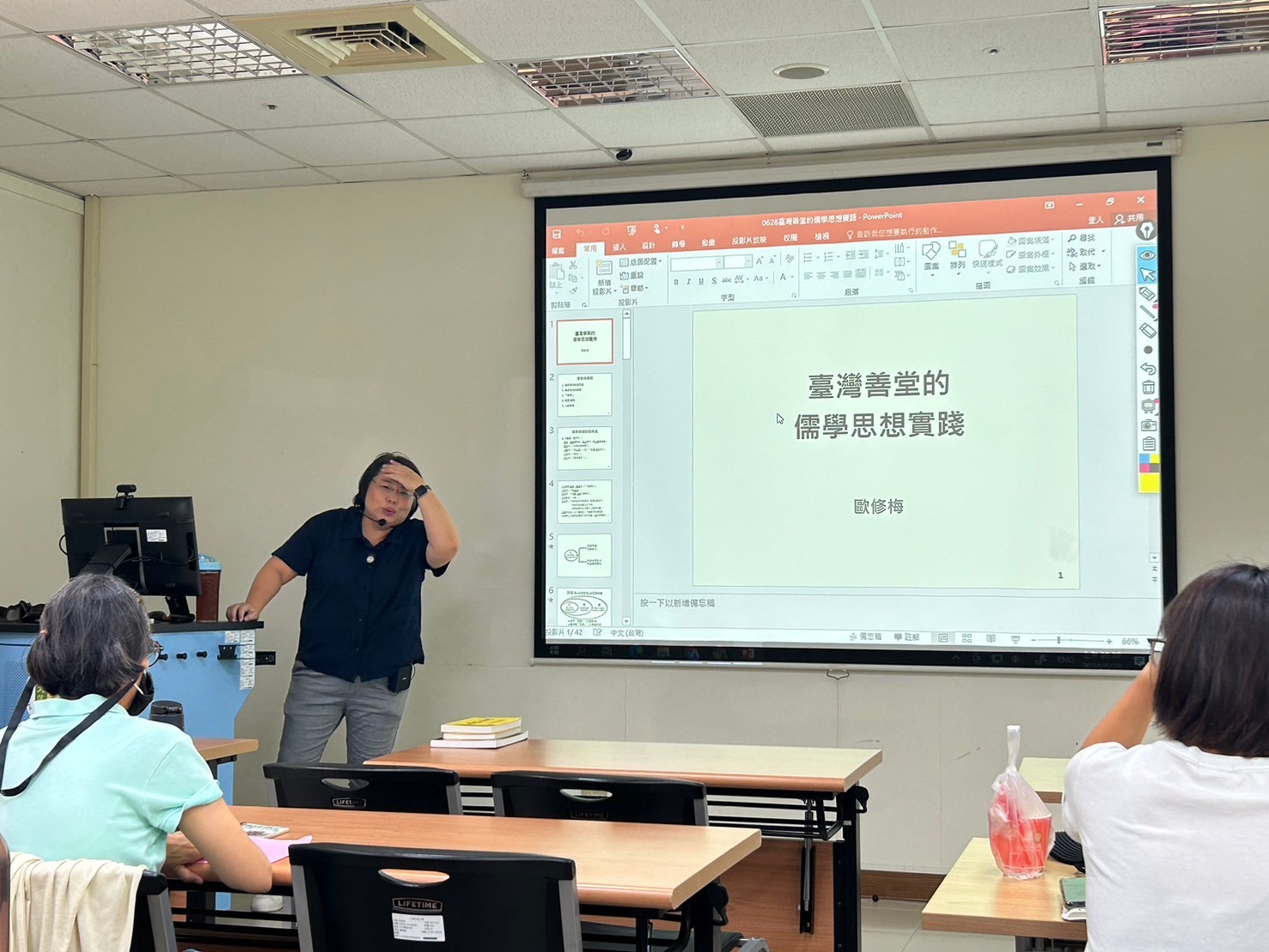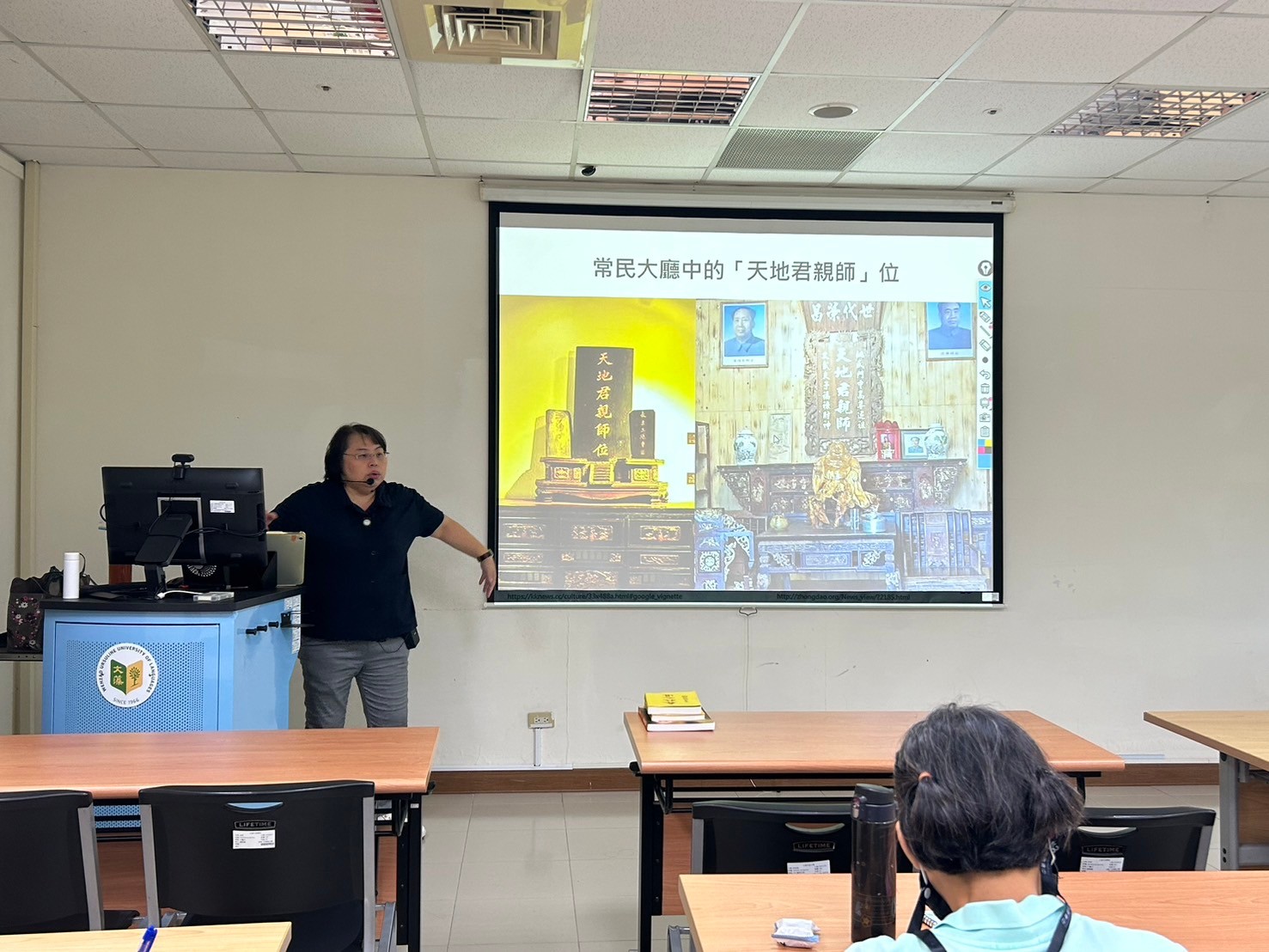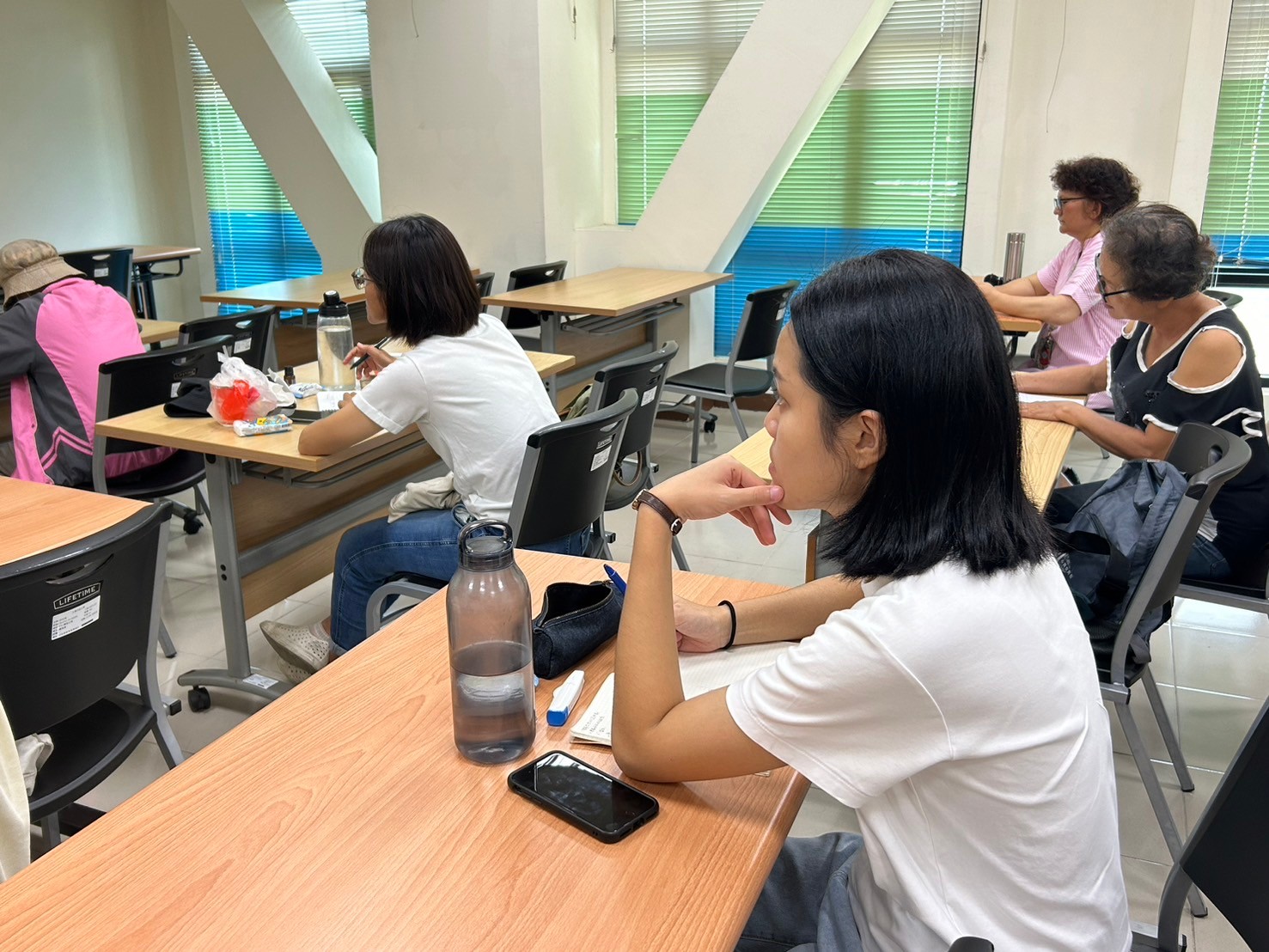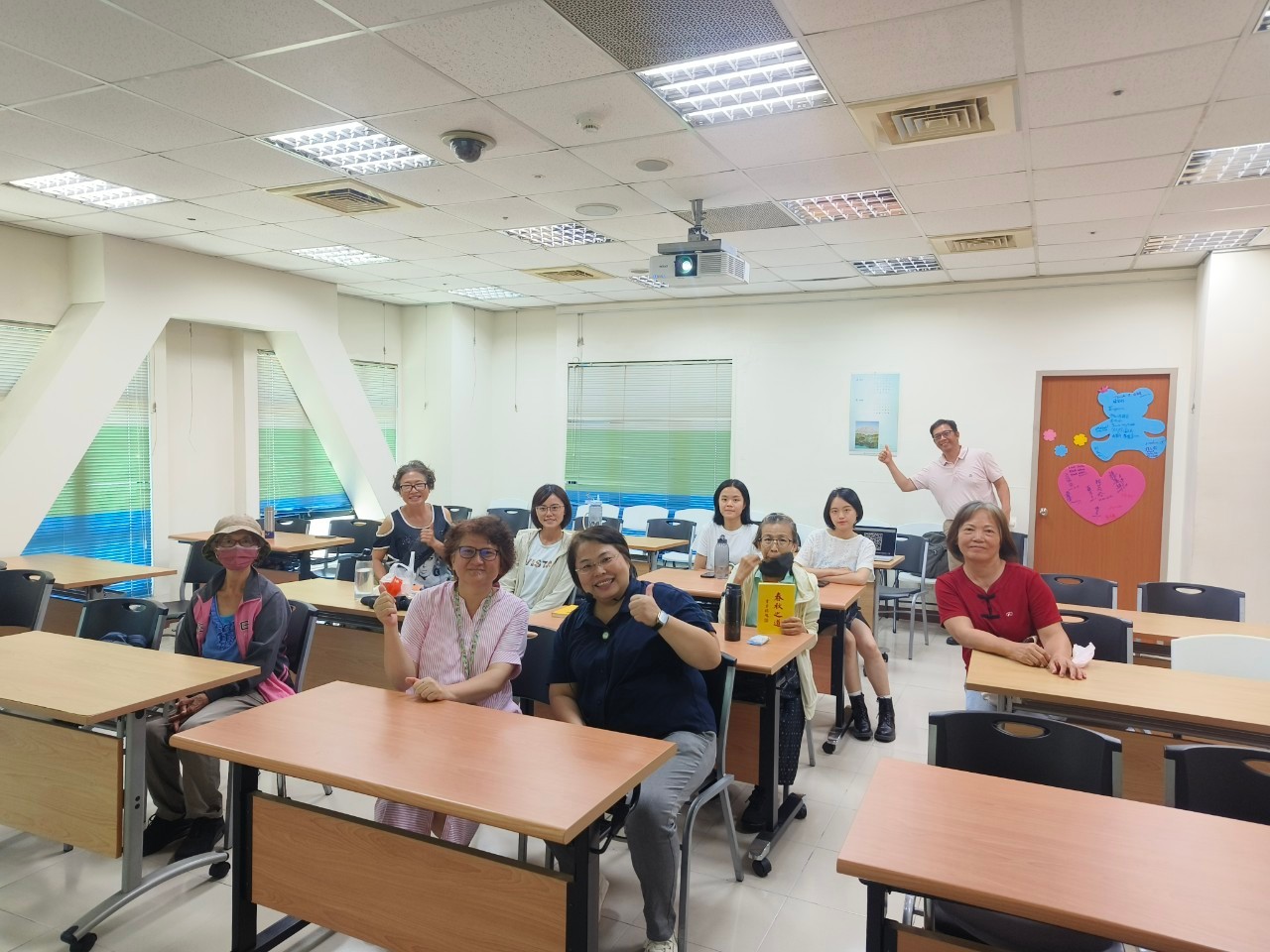【OUR TOWN學生團隊成員 蔡子容 報導】
文藻外語大學USR計畫─「OUR TOWN 社區永續跨域共創平台計畫」於06月28日舉辦了本學期「社區故事採訪編輯社群」的最後一堂專題講座,誠邀文藻校內外的師生與每一位對地方文史有興趣的學員一同來聽講。本次講座有幸仍由本校應華系的歐修梅老師來為學員們授課,講述儒家思想的演變與意義、宗教與儒學的關聯,以及重點介紹本地各具特色的善堂與扶鸞文化,總結了儒門與百姓之間的關係,為本學期的活動劃下了完美的句點。
Wenzao Ursuline University of Languages' USR project, "OUR TOWN Community Sustainable Cross-Domain Collaborative Platform Project," held the final special lecture of this semester's Stories Interviewing Editors Community on June 28. Teachers and students from Wenzao, as well as anyone interested in local history and culture, were invited to attend. This lecture was once again taught by Professor Ou from the Department of Applied Chinese. She discussed the evolution and significance of Confucian thought, the connection between religion and Confucianism, and provided an in-depth introduction to the distinctive local shantangs and fu-luan culture. This lecture summarized the relationship between Confucianism and the common people, bringing this semester's activities to a perfect conclusion.
歐修梅老師以分享《論語・微子》中隱者的故事開始講座,再次提點學員們正統儒學的核心思想——仁的意義。所謂仁、仁心便是一顆愛人的心、推己及人的心,是一顆有主動性的心,鼓勵眾人不僅要做到「已所不欲,勿施於人」,更要學會「己欲立而立人,以欲達而達人」,這意味著我們不只需要克制心理的衝動、不將自身所不喜的事情強加於他人身上,更要主動幫助他人、提攜他人,並為他人的成功而欣喜。從個人的存心養性、家庭的和睦相處,到社會的政通人和,這種「推己及人」、「克己復禮」的儒學價值實踐深根於我們待人處事的標準之中,為當代社會運行的和諧起到了無遠弗屆的正面影響。
Professor Ou began her lecture by sharing the story of the hermit from the "Analects of Confucius, Weizi." She reminded the participants of the core idea of orthodox Confucianism—the significance of "ren" (benevolence). "Ren" signifies a loving heart, an empathetic heart that extends to others, and an active heart that encourages people to not only adhere to the principle of "Do not impose on others what you do not desire yourself" but also to practice "Help others achieve what you wish to achieve yourself." This means that we should not only refrain from imposing our dislikes on others but also actively assist and support others, and take joy in their success. From personal moral cultivation and family harmony to societal governance, this practice of "empathy" and "self-discipline and adherence to propriety" is deeply rooted in our standards of interaction and conduct. It has an immensely positive influence on the harmony of contemporary society.
在講座的後半段,歐修梅老師重點講述了儒家與宗教的關係。所謂「儒教」有著不同的表現形式,既代表著儒學的教化,也意味著儒學的宗教化。以儒學教化為主的信仰活動通常由政府官方主導,以至聖先師孔子為主祀對象,其核心來自孔子、孟子和荀子等聖賢大儒,祭祀活動則是以謝師為主,高雄孔廟便是儒學教化的重要場所之一;儒學的宗教化則更多由民間自主推動,其信仰體系囊括了許多神祇,這些來自佛教、道教或是各地信仰的神明皆願意傾聽信眾的日常祈願,不單單只為莘莘學子而存在,如高雄啟明堂便供奉著延平郡王、關聖帝君和岳飛,孔聖本人則是供奉於後殿,這些神明在地方信仰中佔有重要地位,更再與儒門結合後,展現了台灣本土獨特宗教融合現象。
In the second half of the lecture, Professor Ou focused on the relationship between Confucianism and religion. The term "Confucianism" encompasses different forms, representing both the indoctrination of Confucian teachings and the religious aspects of Confucianism. Faith activities primarily driven by Confucian indoctrination are usually led by the government, with Confucius, Supreme Sage Master, as the principal deity. The core beliefs are derived from Confucius, Mencius, and Xunzi, with rituals centered around expressing gratitude to teachers. The Kaohsiung Confucius Temple is one such important site for Confucian indoctrination. On the other hand, the religious aspect of Confucianism is more often driven by the people themselves, encompassing a belief system that includes various deities from Buddhism, Taoism, and local faiths, who are willing to listen to the daily prayers of their followers. These deities are not only worshipped by scholars but are integral to the broader community. For example, Kaohsiung's Chi Ming Hall enshrines Koxinga, the God Emperor Guansheng, and Yue Fei, with Confucius himself worshipped in the rear hall. These deities hold significant places in local beliefs, and their integration with Confucianism showcases Taiwan's unique phenomenon of religious fusion.
在本次講座中,學員們不僅更加瞭解了儒門與百姓之間的關係,也對儒學概論在現實社會中的實踐有了更深刻的體悟。「OUR TOWN 社區永續跨域共創平台計畫」希望透過不同主題的專題講座為學員們提升個人的文化涵養與學識見聞,鏈結地方信仰、場域文化與民眾,使越來越多的人能夠了解這片孕育我們的土地,結合自身的採訪、編輯與寫作技巧,為推動地方創生、左營舊城的宣傳盡一份力。「社區故事採訪編輯社群」本學期的活動已全數圓滿落幕,我們也將於下學期在此啟動計畫,期待與各位學員們再次相遇於左營舊城!
In this lecture, participants not only gained a deeper understanding of the relationship between Confucianism and the common people but also developed a more profound insight into the practical application of Confucian principles in contemporary society. The "OUR TOWN Community Sustainable Cross-Domain Collaborative Platform Project" aims to enhance the cultural literacy and knowledge of participants through themed lectures, connecting local beliefs, cultural venues, and the community. This allows more people to understand the land that nurtures us, and by combining their interview, editing, and writing skills, they contribute to the promotion of local revitalization and the old town of Zuoying. The "Community Story Interview and Editing Group" has successfully concluded its activities for this semester. We will launch the project again next semester and look forward to meeting all the participants in Zuoying Old Town!

老師進行開場(王馨正 攝影)
Teacher conducted the opening of the activity.

老師進行授課(王馨正 攝影)
Professor gave an introduction of the lecture.

學員專心聽講(王馨正 攝影)
Participants focused on the lecture.

老師與學員們大合照(王馨正 攝影)
Group photo
